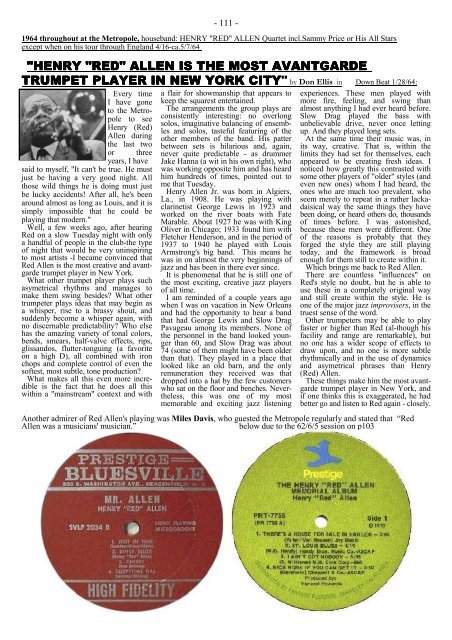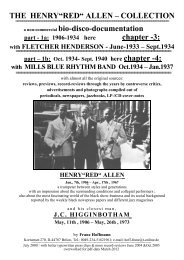Red Allen Chapters 9 - The Jazz Archive
Red Allen Chapters 9 - The Jazz Archive
Red Allen Chapters 9 - The Jazz Archive
Create successful ePaper yourself
Turn your PDF publications into a flip-book with our unique Google optimized e-Paper software.
- 111 -<br />
1964 throughout at the Metropole, houseband: HENRY "RED" ALLEN Quartet incl.Sammy Price or His All Stars<br />
except when on his tour through England 4/16-ca.5/7/64<br />
"HENRY "HENRY "RED" "RED" ALLEN ALLEN IS IS THE THE MOST MOST MOST AVANTGARDE<br />
AVANTGARDE<br />
TRUMPET TRUMPET PLAYER PLAYER IN IN NEW NEW YORK YORK CITY<br />
CITY<br />
TRUMPET PLAYER IN NEW YORK CITY" by Don Ellis in Down Beat 1/28/64:<br />
Every time<br />
I have gone<br />
to the Metropole<br />
to see<br />
Henry (<strong>Red</strong>)<br />
<strong>Allen</strong> during<br />
the last two<br />
or three<br />
years, I have<br />
said to myself, "It can't be true. He must<br />
just be having a very good night. All<br />
those wild things he is doing must just<br />
be lucky accidents! After all, he's been<br />
around almost as long as Louis, and it is<br />
simply impossible that he could be<br />
playing that modern."<br />
Well, a few weeks ago, after hearing<br />
<strong>Red</strong> on a slow Tuesday night with only<br />
a handful of people in the club-the type<br />
of night that would be very uninspiring<br />
to most artists -I became convinced that<br />
<strong>Red</strong> <strong>Allen</strong> is the most creative and avantgarde<br />
trumpet player in New York.<br />
What other trumpet player plays such<br />
asymetrical rhythms and manages to<br />
make them swing besides? What other<br />
trumpeter plays ideas that may begin as<br />
a whisper, rise to a brassy shout, and<br />
suddenly become a whisper again, with<br />
no discernable predictability? Who else<br />
has the amazing variety of tonal colors,<br />
bends, smears, half-valve effects, rips,<br />
glissandos, flutter-tonguing (a favorite<br />
on a high D), all combined with iron<br />
chops and complete control of even the<br />
softest, most subtle, tone production?<br />
What makes all this even more incredible<br />
is the fact that he does all this<br />
within a "mainstream" context and with<br />
a flair for showmanship that appears to<br />
keep the squarest entertained.<br />
<strong>The</strong> arrangements the group plays are<br />
consistently interesting: no overlong<br />
solos, imaginative balancing of ensembles<br />
and solos, tasteful featuring of the<br />
other members of the band. His patter<br />
between sets is hilarious and, again,<br />
never quite predictable - as drummer<br />
Jake Hanna (a wit in his own right), who<br />
was working opposite him and has heard<br />
him hundreds of times, pointed out to<br />
me that Tuesday.<br />
Henry <strong>Allen</strong> Jr. was born in Algiers,<br />
La., in 1908. He was playing with<br />
clarinetist George Lewis in 1923 and<br />
worked on the river boats with Fate<br />
Marable. About 1927 he was with King<br />
Oliver in Chicago; 1933 found him with<br />
Fletcher Henderson, and in the period of<br />
1937 to 1940 he played with Louis<br />
Armstrong's big band. This means he<br />
was in on almost the very beginnings of<br />
jazz and has been in there ever since.<br />
It is phenomenal that he is still one of<br />
the most exciting, creative jazz players<br />
of all time.<br />
I am reminded of a couple years ago<br />
when I was on vacation in New Orleans<br />
and had the opportunity to hear a band<br />
that had George Lewis and Slow Drag<br />
Pavageau among its members. None of<br />
the personnel in the band looked younger<br />
than 60, and Slow Drag was about<br />
74 (some of them might have been older<br />
than that). <strong>The</strong>y played in a place that<br />
looked like an old barn, and the only<br />
remuneration they received was that<br />
dropped into a hat by the few customers<br />
who sat on the floor and benches. Nevertheless,<br />
this was one of my most<br />
memorable and exciting jazz listening<br />
experiences. <strong>The</strong>se men played with<br />
more fire, feeling, and swing than<br />
almost anything I had ever heard before.<br />
Slow Drag played the bass with<br />
unbelievable drive, never once letting<br />
up. And they played long sets.<br />
At the same time their music was, in<br />
its way, creative. That is, within the<br />
limits they had set for themselves, each<br />
appeared to be creating fresh ideas. I<br />
noticed how greatly this contrasted with<br />
some other players of "older" styles (and<br />
even new ones) whom I had heard, the<br />
ones who are much too prevalent, who<br />
seem merely to repeat in a rather lackadaisical<br />
way the same things they have<br />
been doing, or heard others do, thousands<br />
of times before. I was astonished,<br />
because these men were different. One<br />
of the reasons is probably that they<br />
forged the style they are still playing<br />
today, and the framework is broad<br />
enough for them still to create within it.<br />
Which brings me back to <strong>Red</strong> <strong>Allen</strong>.<br />
<strong>The</strong>re are countless "influences" on<br />
<strong>Red</strong>'s style no doubt, but he is able to<br />
use these in a completely original way<br />
and still create within the style. He is<br />
one of the major jazz improvisers, in the<br />
truest sense of the word.<br />
Other trumpeters may be able to play<br />
faster or higher than <strong>Red</strong> (al-though his<br />
facility and range are remarkable), but<br />
no one has a wider scope of effects to<br />
draw upon, and no one is more subtle<br />
rhythmically and in the use of dynamics<br />
and asymetrical phrases than Henry<br />
(<strong>Red</strong>) <strong>Allen</strong>.<br />
<strong>The</strong>se things make him the most avantgarde<br />
trumpet player in New York, and<br />
if one thinks this is exaggerated, he had<br />
better go and listen to <strong>Red</strong> again - closely.<br />
Another admirer of <strong>Red</strong> <strong>Allen</strong>'s playing was Miles Davis, who guested the Metropole regularly and stated that “<strong>Red</strong><br />
<strong>Allen</strong> was a musicians' musician.” below due to the 62/6/5 session on p103



